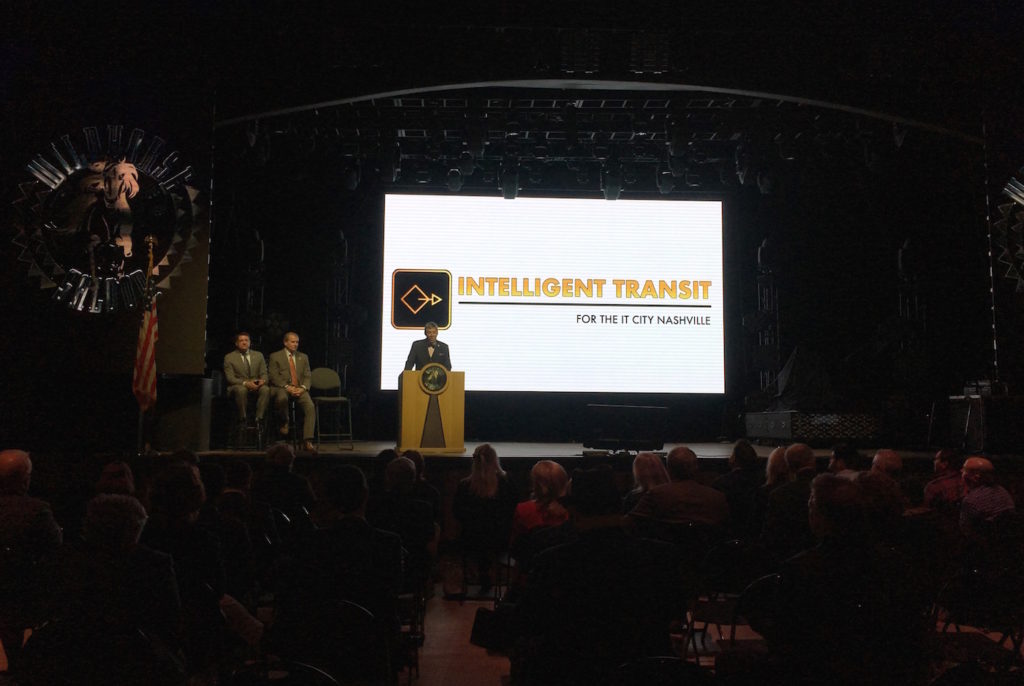
Metro Councilman Robert Swope unveiled his alternative transit proposal on Tuesday, suggesting a futuristic autonomous vehicle fleet and construction of a double-decker interstate loop around downtown Nashville.
This last-minute proposal arrived in the form of a slideshow and a two-page flyer, one day before early voting begins on the Nashville’s 55-page, multi-billion-dollar mass transit proposal.
“I implore everyone to make sure that they’re voting for what they think they’re voting on,” Swope told WPLN.
The councilman was joined on stage at the Wildhorse Saloon by two state lawmakers and aided by an architect who spoke via video feed.
Absent were The Tennessee Department of Transportation and the Nashville Area Metropolitan Planning Organization — the agencies that oversee state roads and interstates, including the allocation of funding. The agencies said they had not been consulted, only learning of the ideas later in the morning.
Next-Gen Tech, Massive Infrastructure
Swope argues that Nashville should not invest in the bus and light rail projects in the coming referendum.
Instead, he bills his proposal as technology-driven, based in part around self-driving buses that he said could be ready in “12 months, not 12 years.”
“We as a community must make the hard decision of eliminating the human driver from the equation,” Swope said.
Dubbed the “Intelligent Transit” system for Nashville, Swope proposes self-driving, self-charging electric buses that run 24-hours per day in a single center lane — plus occasional double-wide passing sections so the buses wouldn’t collide head-on.
Other ideas include:
- construction of three stacked interstates for use by through-traffic near downtown
- relocation of the downtown transit station, plus construction of 34 new stations
- a new power grid to serve the vehicles
- to-be-determined financing that would aim for 25 percent private equity and 50 percent to be covered by the state and federal governments.
The councilman said his entire plan could be completed in less than five years at a cost of $1.65 billion.
“I have been in discussions with the city of Nashville for three-and-a-half years with this same plan,” Swope said. “Everything I have said has been ignored.”
Ideas Not Vetted By Agencies In Charge
Swope said his conversations have focused on Metro officials and leaders in neighboring counties, but the unveiling caught TDOT and the MPO by surprise.
“We have not even been involved,” said TDOT spokeswoman B.J. Doughty, who noted the department received a call on Tuesday related to the proposal concerning the laws that govern roadway lanes.
While unprepared to comment on the specifics of the two-page flyer, Doughty said suggestions such as constructing new interstates atop those that already exist, and the transition of traffic lanes into autonomous bus lanes, would be a “lengthy process.”
“I don’t think we’ve ever seriously considered something like that, and not where you can put any kind of cost on that,” she said.
Separately, TDOT has been in conversations for at least three years with the Federal Highway Administration about
allowing transit buses to use the shoulders of interstates.
Meanwhile,
the MPO, which allocates billions of dollars in federal transportation funds to the seven-county region was also provided the councilman’s flyer.
“I think that would be a very challenging sell to the mayors that allocate federal funds,” said Michelle Lacewell, interim executive director.
The MPO operates off of an evolving long-range plan and works with a regional board of local and state officials to identify projects and distribute funds. The organization’s
most recent plan controls more than $8 billion.
Lacewell wouldn’t comment on the feasibility of the councilman’s ideas, timeline or costs, but noted that a price tag of $1.65 billion would have ramifications.
“For those kinds of dollars, we’d have to reallocate federal funds, and that decision would be made by the leadership across the region on the MPO board,” Lacewell said.


